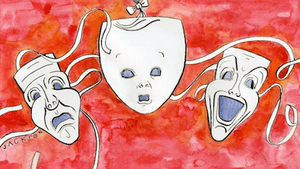Stay in the Loop
BSR publishes on a weekly schedule, with an email newsletter every Wednesday and Thursday morning. There’s no paywall, and subscribing is always free.
The art in parenting and parenting in art
What changes when working artists become parents

We were about to get started, and Catherine Slusar was worried. It was our first day of work on Seth Rozin’s 2002 play Missing Link, and Slusar and I played husband and wife. It was her first show after having twins. “By many reckonings, this was a terrible show to do post-baby,” Slusar recalls. “A story about parents sending their young only child off on a plane for a school trip to France. The plane goes down. The parents fall apart. What was I thinking?” The play asks, through a difficult, but ultimately hopeful journey, how do parents deal with this terrifying loss?
At the time, I understood in an intellectual way, but not viscerally like Slusar; I wouldn’t have children for another nine years. She had the real experience, and she’d have to contemplate the loss of a child so soon after becoming a parent. It was unthinkable, but that was what the role required.
Theory into practice
As I stood in the delivery room cradling my daughter just moments after she was born, my mind went back to that first day of rehearsal for Missing Link. I never would have expected that to be my first thought upon becoming a parent, but it was as if an avalanche of clarity descended upon me. In that moment, I knew exactly what Slusar had meant, and why it had been so difficult for her. Because I was a parent now, and in ways I didn’t even begin to understand, my life — as a person and an artist — had irrevocably changed.
Some artist parents decide to leave the arts altogether and turn to something steadier and more lucrative to make ends meet. Many artists also teach, plenty do standardized patient work, and, of course, there are always the more traditional artist side jobs of waiting tables and bartending. But no matter what sacrifices might be required, most artists aren't willing to give up their art.
Miriam White, a Philadelphia-based actor, writer, and director, says, "I suspected that my new identity as a mom would supersede my desire to perform, or perhaps that some primal instinct would take over and I would instinctively gravitate towards a career with more stability. Silly Miriam. Once the craziness of the first few months subsided, my need to perform began to surface in full force. I now feel like I live in a constant state of competing priorities...I have access to this new well of emotions that want to be translated into interpreting characters.”
In Philly, working artists are home-owning artists
If you are going to be a parent and work in the arts, Philadelphia is a great place to do it. I've done numerous shows where nearly everyone in the cast owned their own homes, which is unheard of in better-known theater centers like New York, Chicago, or Washington, DC.
Kristin Chouiniere’s first role after having kids was in The Syringa Tree in 2014 at Theatre Horizon. She says, "Perhaps the best thing about being an artist raising a family in Philadelphia is that we can afford to do it. We can own houses, raise families, and still be working artists. We don’t necessarily have to choose. The way that we make art might shift — I’m not sure I’ll ever get back to being a full-time actor — and I’m lucky that my contribution is varied and considerably smaller than [my husband's]. If I fail…I always have this mom gig to keep me busy. And I wouldn’t trade it."
Sacrificing for her son
Of course, it's always harder when you have to do it on your own. Pat Adams, the Wilma Theater’s extraordinary stage manager, had her son when she was still in college. "The theater department at school was instrumental in helping me learn how to cope with all the new responsibilities.... From the moment my son was born, trying to figure out how to provide for him was my number one priority. I had a series of small, low-paying jobs. I was still in school, part-time mostly, but I had to get my degree. I received food stamps and medical assistance for a while — anything that would help me provide for him. I became a stage manager rather than an actor, because I decided that the work would be more steady. Thank God, I was good at it."
Parenting isn't for everyone, but for those artists who do have children, the rewards are great, even if the challenges — financial and otherwise — can be daunting. Slusar explains, “Role after role these days I wonder, ‘How would I have been capable of that work had I not had children?’ I just played King Lear. There is the moment when the king enters, carrying his dead beloved child in his arms. He realizes he will never see her again, and says ‘never’ five times: 'Never. Never. Never. Never. Never.' The yawning chasm of the nevers — a moan, a groan, a gaping absence — would have been impossible had I not experienced the fullness of the ‘evers’ of parenthood.”
Sign up for our newsletter
All of the week's new articles, all in one place. Sign up for the free weekly BSR newsletters, and don't miss a conversation.

 Seth Reichgott
Seth Reichgott
 Illustration by Mike Jackson
Illustration by Mike Jackson